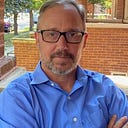Left Blank: Confessions of a Son of Hudson, Ohio
I run an association of professional speechwriters, and yesterday one of our members sent me an article about a 77-year-old Retired Lt. Colonel, Barnard Kemter, who was giving a speech on Memorial Day when somebody purposely cut off his mic.
“I’m sure you’ve already gotten this from multiple sources,” she said, “but the Ohio connection makes it irresistibly forwardable.”
In fact, the controversy arose in Hudson, my very hometown, where I’d just been written upearlier this week under the headline, “Homegrown Author Takes Deep Dive Into Art of Communication Amid Divisiveness.” My new book is An Effort to Understand: Hearing One Another (and Ourselves) in a Nation Cracked in Half.
As I read the piece, I understood exactly why the Lt. Colonel had had his mic cut off. He was talking about Black people — specifically, about new scholarship on the Black origins of the Memorial Day holiday.
And Black history, said one of the two American Legion officials who cut off Kemter’s mic, “was not relevant to our program today.”
Growing up in Hudson, Black history was never relevant to our program of the day. Black present, either.
This despite the fact that Hudson had been a stop on the Underground Railroad, and home to the abolitionist John Brown. My mother wrote in a journal in the 1970s that she wanted to move, because “the only blacks the kids see here are on television.”
Or at the Marathon station on Main Street, where the mechanics were Black — Everett and Coleman. My dad too-frequently described them as “good friends of mine.” I can’t remember if I overheard my mother calling him out on the statement, or if I just sensed her skepticism.
Hudson wasn’t virulently racist. It’s just that race wasn’t a factor, unless you happened to be Angela Clark, the only Black kid in my Hudson High School class of approximately 270 otherwise upper-middle class white kids. I know not one more thing about Angela beyond what I have just said, aside from that she was … quiet?
A classmate remembers Angela better, saying on a Facebook conversation I started about growing up in Hudson, “I was one of Angela’s 1st friends in 8th grade … Her family treated me very well and my family loved her. We had a few sleepovers at my home and hers … Angela was in band (Hudson Dancers).” She recalled two other Black students in our school of more than 1,000, and said “they were liked and well respected by many of [our] classmates. I can’t speak for their experience. All I know is I liked them and their families.” And she added that the Cleveland Cavaliers basketball coach Lenny Wilkins lived in Hudson.
That’s how we talked about the few Black people in Hudson, in the rare instances when we talked about them at all. We couldn’t speak for their experience; it was enough for us to like them, and treat them nice. Another high school classmate shared with me her written “journey to antiracism.” In it, she remembered, “You didn’t talk about race. I have vague memories of my grandfathers on both sides occasionally speaking in a derogatory way about Black people. But the women in the family would quickly hush them to keep the peace, so I think I sensed early on that race was a divisive and taboo topic.”
Beyond the irony of its antislavery roots, I don’t actually think Hudson was all that unusual. I think a lot of white people grew up in white towns or insular communities and didn’t confront race directly until much later in life, except for the intellectual exercise involved in learning about slavery and reading To Kill a Mockingbird.
“I feel like a kindergartener who has begun school and is just starting to realize how very much there is to learn and how many more years of school lie ahead,” my aspiring antiracist classmate wrote.
I replied to her: “Kindergarten is weird, at 52; the seats are too small! And whatever education you get later in life — and I feel like I’ve gotten a lot in my life in Chicago — it doesn’t make up for those formative years, left blank.”
No grownup wants to be a kindergartener, which is why I think a lot of us get defensive when someone sets out to teach us something we feel we should have known all along. Like what it is like to be Black in America — or at least Angela Clark, in Hudson, Ohio.
But many of us simply are kindergarteners on the massively complicated subject of race in America.
And the only question is, What kind of kindergarteners are we going to be?
